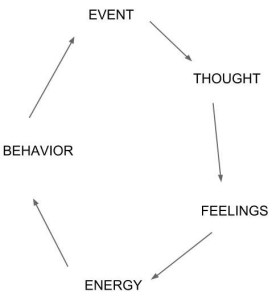 Your THOUGHTS! What keeps you stuck in any area of your life is what you think about yourself, money, relationships, kids, spouse, work, time, family, your world. We call these thoughts limiting mindsets or beliefs. Sometimes we don’t even know that we are functioning from such a negative place until we begin to pay attention.
Your THOUGHTS! What keeps you stuck in any area of your life is what you think about yourself, money, relationships, kids, spouse, work, time, family, your world. We call these thoughts limiting mindsets or beliefs. Sometimes we don’t even know that we are functioning from such a negative place until we begin to pay attention.
The good news is that those thoughts CAN BE CHANGED in order to move forward! For example, believing that “all men are pigs” quite possibly will keep you from enjoying a wonderful relationship with a loving, caring man.
You say you have evidence that your thought is the TRUTH? Our brains will help us find evidence that ANY thought has some truth that speaks from our past experience……but it does not have to be the truth for our lives going forward. We have a choice.
According to Glenn R. Schiraldi in The Self Esteem Workbook, he suggests there are several types of limiting thoughts and beliefs (that some people call “gremlin” thoughts): Which do YOU make a habit of using the most?
1. Assuming – We assume the worst without testing the evidence. Ex. Assuming someone is criticizing you vs. asking them to clarify. OR “I know I am going to screw this up.” vs. “I may or may not do a good job but I am willing to experiment.”
2. Shoulds (Musts/Oughts) – Shoulds are demands we make of ourselves or others. “I should be skinnier.” “I should not make mistakes.” “I should be happy and never anxious or tired.” These types of statements usually just make us feel worse. Replace “shoulds” with “would” or “could” or “want to’s.” Ex. ”I would like to do that.” Or “How could I do that more/less?”
3. The Fairy-Tale Fantasy – The fairy tale fantasy means demanding the ideal from life. This is a special type of “should.” “That’s not fair.” or “Why did that have to happen?” often is a person’s way of saying that is not how life should go. REALLY? In reality, bad and unfair things happen to good people….sometimes randomly, sometimes because of the unreasonableness of others, and sometimes because of our own imperfections. This particular type of “should” only invites disappointment. Again, using “would” or “could” vs. “should” can be more effective to finding real solutions. “It would be nice for this to happen.” or “How could I improve this situation.”
4. All or Nothing Thinking – This type of thinking holds a person to the impossible standard of perfectionism which invites feelings of low self-worth when perfection is not met. “If I do not perform the best, I am a loser.” However, performing at 80% or 57% is NOT 0 percent. Poor performance never makes a person worthless, just fallible. Ask yourself, “Why must I score 100%?” You may then hear replies of low self-worth in your mind.
5. Overgeneralizing – Overgeneralizing is deciding that negative experiences describe your life completely. For example, “I always ruin everything.” or “They never do this.” Such global statements are unkind, depressing, and usually inaccurate to some degree. Use more precise language like “Some of my skills are not yet developed.” or “Sometimes they don’t do this.” You can then find small ways to improve the situation and simultaneously notice what IS going well.
6. Labeling – Using a term as though it describes a person completely such as, “I’m such a loser.” Humans are more complex than one simple term can describe. Instead, confine labels to behaviors. “That was a silly thing to do.”
7. Dwelling in the negative – When a negative situation occurs within the context of something pleasant or okay, however, we focus on the one negative aspect. For example, one pleasant evening, your spouse does something annoying, and you focus on that particular behavior, and allow it to ruin the entire evening and possibly negatively impact your marriage. Or, your teenager comes home with good grades except for one F. Focusing on the F vs. seeing the hard work they have done can leave them with feelings of low self-esteem and a more challenging parent-child relationship. A solution to this habit includes re-examining your options. “What pleasing things can I still find to enjoy?” “What went right?” “How would someone with sound self-esteem view this situation?”
8. Rejecting the positive – Dwelling on the negative overlooks the positive aspects and keeps our self-esteem low. For example, someone compliments you on a job well done and you reply, “That was really nothing. Anyone could do that.” If you can give someone else the credit for doing well, why not do the same for yourself?
9. Unfavorable comparisons – This is poison to your self-worth! When comparing yourself to others, you minimize your strengths and maximize others’ strengths, focusing on being inadequate or inferior to others. For example, “I am just a mom. She is the owner of a successful company.” Challenge this distortion by asking yourself, “Why must I compare?” “What keeps me from appreciating each person’s strengths and weaknesses?” Another’s contributions are not necessarily better, just different.”
10. Catastrophizing – When you believe that something is a catastrophe, you magnify how horrible the situation is and convince ourselves that we are not capable of coping with it. The reality is that we CAN handle most situations even though they are unpleasant, inconvenient or challenging. To challenge this belief, we can ask ourselves, “What are the odds of this happening?” or “What is the worst thing that can happen?”
11. Personalizing – Seeing yourself more a part of a situation than you really are. For example, when a child misbehaves and the mom thinks she is a bad mom because he misbehaved. To combat this distortion, distinguish between what influences another situation vs. causes the situation. Also, instead of thinking, “What is wrong with me?” one might say “This is a difficult task.”
12. Blaming – (This is a nasty relationship habit!!!) This is the opposite of personalizing…not taking any responsibility for what happens to you. Placing all the blame on someone or something outside of yourself. This is putting you in victim mode, too powerless to cope. A more empowered way to deal with a situation is to recognize the influences of the situation but also see what part you have control over. “Yes, she reacted very unfairly, but I choose not to be bitter and cynical.” Or “I did not complete the project in a timely manner. I will plan better next time.” The focus is not on judgment of the core self, but behaviors.
13. Making Feelings Fact – Making feelings facts is taking one’s feelings as proof of the way things really are. “I feel inadequate, so I must be inadequate.”
What is a thought you COULD have about your life that could take you from the outcomes you have been getting in “stuck” mode to the outcome you want?
Good behavior habits begin with good thought habits!









